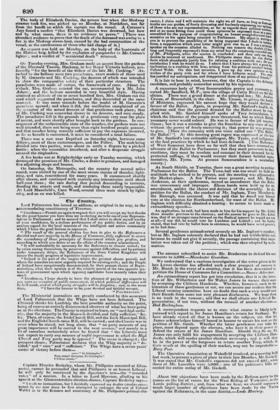Captain Maurice Berkeley, whom Mr. Phillpotts unseated at Glou- cester,
cannot be persuaded that said Phillpotts is an honest Liberal : he will only be convinced by the Spectator's test—the "recorded votes" of a session. Iii a letter to Lord Moreton, alluding to his speech at the Gloucestershire election-dinner, Captain Berkeley says- " I made no insinuations, but I decidedly expressed my doubts (doubts enter- tained by me ever since he first attempted to endanger the seat of Colonel Webb) as to the firmness and consistency of Mr. Phillpotts's political cha- aP racter, I claim and I will maintain the right we all have, so long as facts ,th„ truths are our guides, of freely discussing and fearlessly expressing our o ilea; of those who are our representatives, so far as regards their political coPod and at no more fitting time could those opinions be expressed than at a :i; assembled for the purpose of congratulating an honest straightforward sentative on his again being returned to Parliament. My object in writ'- you is to prevent the possibility of its being supposed that I dealt in hail. t') tions, a supposition which your letter might give rise to, as I was a priacitilcai speaker on the occasion alluded to. Nothing can remove the doubts (I long and frequently expressed) from my mind but the constantly recorded of Mr. Phitlpotts, when the session is concluded : and then only sar, doubts be removed or confirmed. Mr. Phillpotts states that he can ditch; facts which abundantly justify him for refusing a coalition with rue; for you- satisfaction I wish he would do so. I admit that I have always felt a ereardy. inclination to a coalition with him, arising from his political conduct towed,
Colonel Webb. On this last occasion, I gave up my own opinions to the wishes of the party with and for whomI have hitherto acted. The true
has justified my anticipations, and disappointed those of my politicailrf.rieAunddi.r"ew It is fair to bear in mind, however, that the Captain is the defeated candidate, and probably somewhat soured by his rejection. A numerous body of West Somersetshire gentry and yeomanry tr. corted Mr. Sandford, M.P., into the village of Curry Rivet on the 231 ultimo. There was a grand dinner at the principal inn ; A Crosse, of Broomfield, in the chair. Mr. Crosse, in giving the hada of Ministers, expressed his earnest hope that they would declare ir, favour of the Ballot. Again, in proposing Mr. Sanford's health, (be chairman said that the general demand for the Ballot must be en. plied with. Mr. Sanford himself spoke of Tory intimidation, 14 which the liberties of the people were threatened, but to which Britiii yeomanry never would submit. He was in favour of the 50l. tenantey clause ; but it was a mistake to give the franchise to any class of ace without the power of freely exercising it;, that power lie was prepared to give. [Here the company with one voice called out "The Ballot, the Ballot ! "1 At this meeting great regret was expressed at the lost of Mr. Sanford's late estimable colleague, Mr. Tynte, arid indignatior,
at the foul practices by which be had been defeated. The Reformert of West Somerset have done so far well that they have returned one advocate of the Ballot to Parliament ; but they must persevere in their i
exertions, they must be resolute and constant n their demand fur the protected suffrage, if they would recover their former faithful rein. sentative, Mr. Tynte. At present Somersetshire is a neuttabisd county.] At South Shields, on Tuesday, there was a great meeting to petition Parliament for the Ballot. The Town-hall was too small to hold the multitude who wished to be present, and the meeting was adjourned to the Market-place. A few Tories were present ; and Mr. Robert Anderson, as their spokesman, moved an amendment that the Ballot was unnecessary and improper. Eleven hands were held up for the amendment, amidst the cheers and derision of the assembly. In the petition for the Ballot, the conduct of Mr. Ingham, Tory Member for the Borough, was censured. It was said that he dared not himself vote at the election for Northumberland, for want of the Ballot. Mr. Ingham with difficulty obtained a hearing : he seems to have made a. extraordinary speech— An application, he said, had been made to him for his support by Mr. Liddell three months previous to the election ; and the answer he gave to Mr. Liddell was, that if no stranger came forward on the Radical interest he weuld not we at all—if one did, he would vote for Lanffiton and Liddell ; and be further • stated, that had vote by ballot been in existence, he would have acted preciatly as he had done.
Several gentlemen animadverted severely on Mr, Ingham's conduct; but as Mr. Ingham solemnly declared that he bad not withheld his vote because he could not give it secretly, the passage containing that trope 1, tation was taken out of the petition ; which was then adopted by arch. mation.


























 Previous page
Previous page